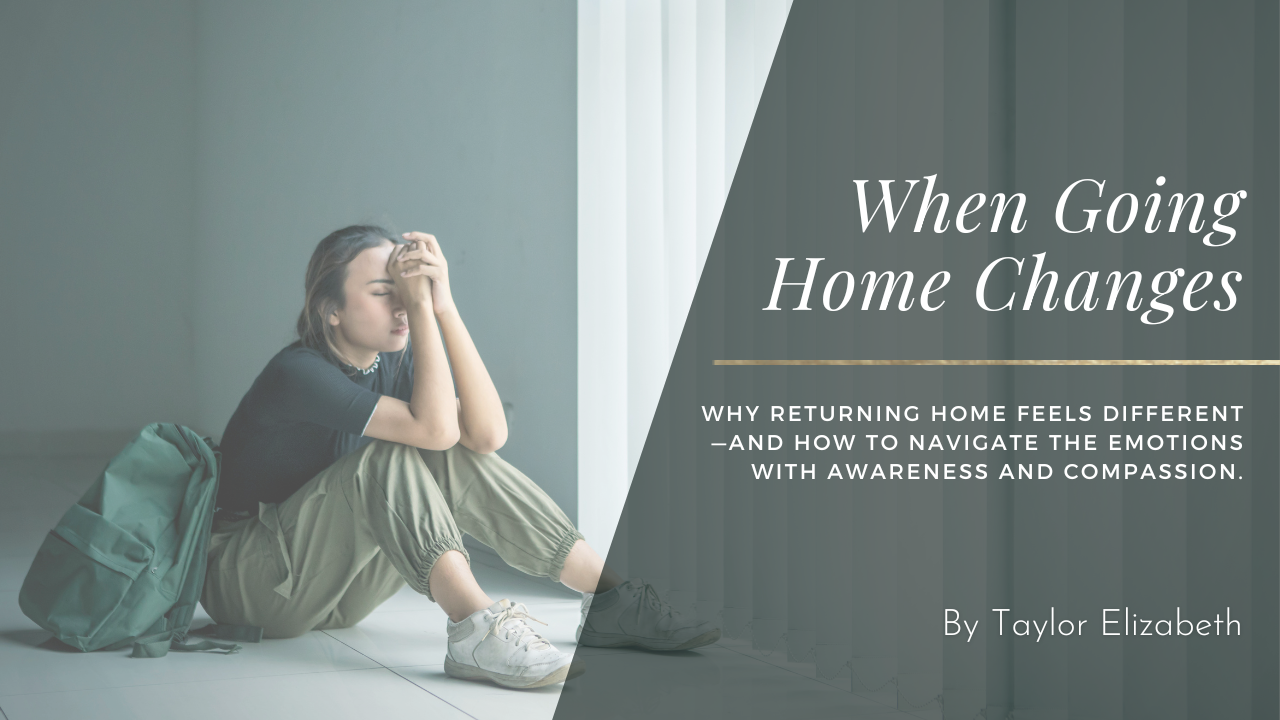Why Going Home Feels So Complicated, And How to Handle It with Consciousness and Compassion
Aug 20, 2025
There’s a strange emotional dissonance that can surface when you return “home.”
A place that once held your roots now feels slightly foreign.
The house is the same, but you’ve changed.
You recognize the people, the rhythms, the rooms, but somehow, you don’t quite recognize yourself in them anymore.
This is something I know intimately.
I’ve been living away from home since I was 17, and abroad for the past 15 years. And yet, even now, every time I return, I feel it. That quiet internal conflict. The comfort of familiarity layered with the discomfort of how much has changed, both outside and within.
And now, returning as a mother with my daughter by my side, it carries an entirely different emotional weight.
I’m not only witnessing home through my own evolved lens, I’m watching her experience it for the first time.
There’s beauty in that. But also an added depth of reflection: What version of me am I bringing back? What parts do I want her to see? And what parts do I leave behind?
What’s Really Happening: The Emotional Landscape of “Coming Home”
From an emotional intelligence and neuroscience perspective, here’s what may be unfolding beneath the surface:
1. You Regress in Familiar Spaces
You might slip into old roles or habits, even when you don’t mean to. That’s emotional regression. When the body returns to a familiar environment, the nervous system often reactivates long-established emotional patterns, even if your mind knows better.
The brain connects the environment with behavior.
Step back into your old bedroom, and suddenly you feel like a teenager again, reactive, restless, uncertain.
2. You’ve Changed, But “Home” Hasn’t
You’ve grown, emotionally, mentally, spiritually. You’ve built a life that no longer revolves around that place. But when the external environment stays the same while your internal world has evolved, emotional dissonance emerges.
That’s cognitive dissonance: when the person you are now no longer fits neatly into the setting that shaped who you were.
3. Nostalgia is Emotionally Complex
We often idealize “home” as a place of comfort, safety, and identity. But going back can surface grief, sadness, and unexpected frustration.
You’re not just revisiting a place, you’re confronting the distance between then and now.
You Are Not Alone
These emotions are common, especially for those who’ve built a life abroad or experienced significant personal growth.
“I’m grateful for my roots, but I don’t belong here anymore.”
“I love them, but I’ve outgrown this version of home.”
This doesn’t make you ungrateful.
It makes you emotionally aware.
It means you’ve grown.
How to Ease the Emotional Discomfort When Going Home
1. Be Kind to Yourself First
This experience is valid. You don’t need to minimize your discomfort just because you’re “supposed” to feel grateful.
Growth can be painful, even when it’s beautiful.
Reminder: Feeling off doesn’t mean you’re unloving. It means you’re evolving.
2. Name What You’re Feeling
Is it sadness? Guilt? Frustration? Overwhelm? Emotional exhaustion?
Naming the emotion gives your brain structure and helps regulate your response.
In emotional intelligence, we call this: “Name it to tame it.”
3. Let Conflicting Emotions Coexist
It’s okay to feel love and frustration. Comfort and detachment. You don’t have to choose.
The ability to hold emotional complexity is a sign of maturity.
4. Create Small Anchors
When you feel emotionally untethered, return to your grounding practices, journaling, a daily walk, a quiet moment alone, a call with someone who knows the current you.
These small actions help you return to your present self.
5. Honor the Growth, Not Just the Loss
Instead of mourning what no longer fits, try celebrating the growth that created the change.
“This place shaped me. But I’ve expanded beyond it, and that’s okay.”
6. See It Through Your Child’s Eyes
If you’re returning as a parent, like I am, use this moment to reflect.
What version of “home” do you want your child to remember? What do you want to preserve, shift, or evolve?
This can be a full-circle moment. A quiet reclaiming of identity, culture, or softness.
Final Thought: You’re Not Going Back, You’re Visiting as Who You Are Now
You’re not the same. And neither is “home.”
You’re not broken for noticing the difference, you’re simply aware.
You don’t have to fully fit back into the life you once lived in order to love it.
You can carry love and distance.
You can be grateful and ready to leave again.
You can return home without needing to return to who you once were.
And when you bring your child into that space, you’re not just visiting.
You’re expanding the definition of home for a whole new generation.
SUBSCRIBE FOR MORE INSIGHTS
Immerse yourself in a curated collection of insightful articles designed to illuminate your path toward personal and professional growth.
An Elegant Perspective is a collection of The Elegance Advisor's insights and coaching offered as a resource to empower you to cultivate the elegance that resides within.
Join us as we explore the art of living gracefully, unlocking your true potential and embracing the elegance that transforms not just how you present yourself, but how you feel every day.
The Elegance Advisor Consultancy will never send you SPAM or sell your information, for any reason.

